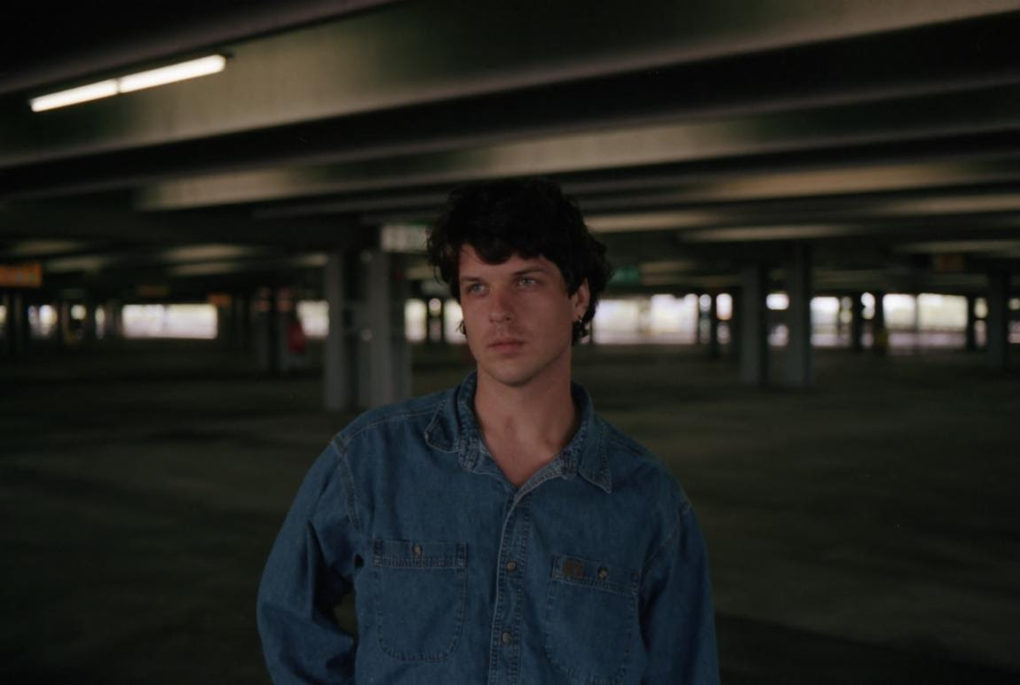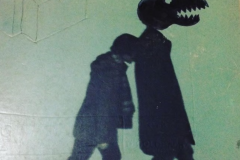Amiture is the new project of New York City-based musician and filmmaker Jack Whitescarver, and today he is announcing his forthcoming debut album The Beach, set for release on March 19th via Dots Per Inch Music. To celebrate the announcement, he is also releasing the first single “Touch” along with a video directed by Jack alongside director/choreographer/performer Anna Thérèse Witenberg, who also stars in the video. Like Cold Cave with pedal-steel guitar, this goth/electro song is a new sound made of familiar elements.
Jack says of the song, “Touch” is about the moments of contact, both physical and otherwise, that reconnect one with their desires. While sometimes a moment of healing, a touch can also send one spiraling into longing for what is lost.
Of the video for “Touch” he says, “I came to Anna with an idea for a video that was inspired by movement work she had made in the past around the idea of “possession.” We both love the world of the film of the same name by Andrej Zulwaski and Isabelle Adjani’s performance. Anna wrote a story and devised her character and we shot the video around that. We shot the video two days during Christmas 2020 with Cyrus Duff, which was great because Cyrus is my best friend and he’s got a great eye. Something about being in New York and finding these locations like the parking garage, when everything was so empty and cold, fit with the story and the song. We had to keep a tiny crew because of the pandemic but it worked in our favor as we were able to appreciate the unique form the city took through the lens of the video.”
Having grown up in the American South, Amiture’s story begins in the heavy, humid air of Virginia and finds itself now in the vaporized bodily aether of the New York dance floor. This perspective is conveyed in his music with a certain darkness, narrative patience, and indeterminacy. Images of love, loss, and desire puncture the danceable rhythms and lend an emotional consistency that carries the listener through his debut record, The Beach. Amiture is pleased in conjuring a sonic world that can appear veiled—and even playfully illegible. His character is that of a narrator condemned to give form to a series of events that may bear no meaning in their association, but all of which are packed tight with emotion, interest, and memory. He keeps his own dignity by taunting the listener, but only a little bit. The Beach pursues this meandering expressivity with grace.
In his prior musical work, Amiture used his given name, Jack Whitescarver. Under this name, he spent about two years touring the music that would become The Beach along with his older catalog of sparse, experimental, and sometimes humorous music. The songs that make up Amiture’s debut took their form in front of live audiences that placed what-would-become-Amiture’s music in the worlds of acts like Pelada, Kedr Livanskiy, and Minimal Violence.
Listening to the music & lyrics of The Beach is like using a fading flashlight to illuminate a cave—where one is unsure of whether they are on their way out or if they are just getting deeper. This journey, however, is reprised and explored with club beats, pop melodies, and a production fidelity that couples creative ambition and spatial darkness in ways not unlike the baroque pop masterpieces of late 1960s Scott Walker. The Beach can be a pop album or it can be a broody meditation—this choice is up to the listener.
The music of Amiture also has a filmic quality to it, one that adds a VHS sheen to the diaristic aura of this body of songs. The tracks “Touch,” “The Beach,” and “Let’s Talk” display this characteristic best. On “The Beach,” Amituresings, “And I’m staring out that window out at the sea—There I see the rare reflection of you and me—The dog is racing down from the other side of the hill.” It is in the simultaneity of feeling and image that Amiture’s music feels born of a cinematic instinct—nothing is explained but everything is on display.
Amiture’s sound exists in the vast in-betweens of Kate Bush and Suicide, or Throbbing Gristle and Prince. It nods to contemporary club, dance, & sound music while paying homage to melody and lyricism. The Beach, however, is not an attempt at staking a flag in some unknown sonic universe, either. The textures, lyrics, and imagery are indeed referential, but they aim to be so in such a way that deepens the listener’s aesthetic & emotional understanding of said references. This is an album that unearths the roots systems of meaning of seemingly familiar plant life—but these revealed limbs may leave more questions than they give answers. The Beach is a reminder that even universal feelings can appear more alien than familiar under close inspection.











Social Media